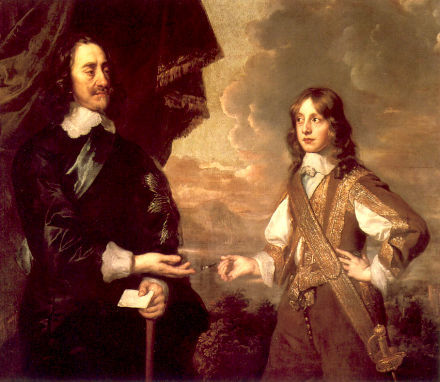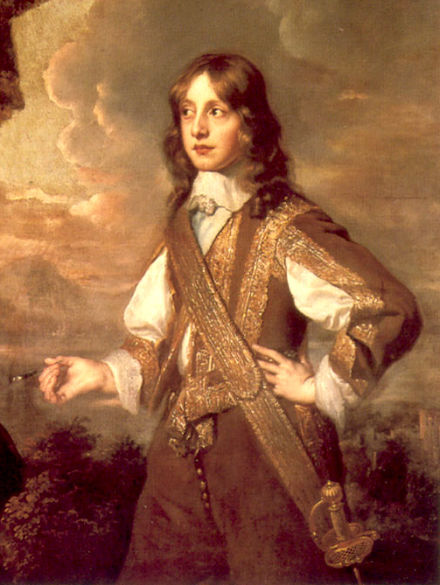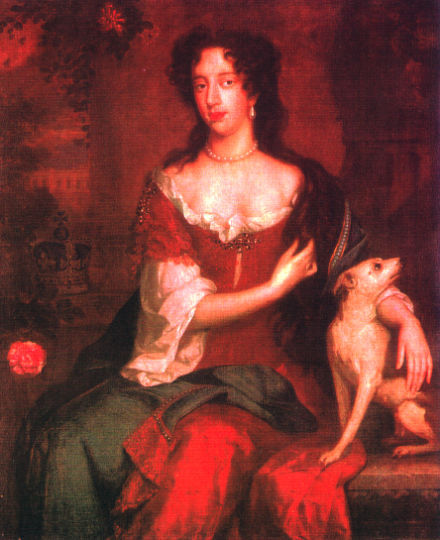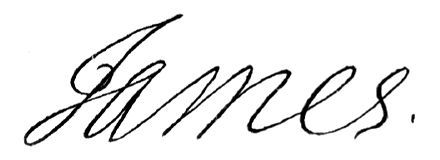
About Andrew Cusack
 Writer, web designer, etc.; born in New York; educated in Argentina, Scotland, and South Africa; now based in London.
Writer, web designer, etc.; born in New York; educated in Argentina, Scotland, and South Africa; now based in London. read more
News
Blogs
Reviews & Periodicals
Arts & Design
World
France
Mitteleuropa
Knickerbockers
Argentina
The Levant
Africa
Cape of Good Hope
Netherlands
Scandinavia
Québec
India
Muscovy
Germany
Academica
James II, By the Grace of God

EVERY NOW AND THEN, there is a minor hubbub; perhaps not even enough to be called a hubbub, but call it a hubbub we shall. The hubbub in question is on the subject of James II (seen above, with his father Charles I), our last Catholic king, and the man who (as Duke of York) gave his name to the great city and land of New York. We have previously expounded upon King James on this little corner of the web, but fresh notice was brought by Fr. Nicholas Schofield on his Roman Miscellany blog. In the blog post A Royal Penitent, Fr. Nicholas writes:
By the time of his death in 1701, James had gained a reputation for sanctity and the cause for his beatification was even launched. He had kept an almost monastic daily routine of morning prayer, meditation, two Masses, vespers and rosary. He also received Holy Communion twice a week (which was, at the time, very unusual), made a monthly day of recollection, said prayers for the Conversion of England every third Wednesday and undertook bodily penances. He was a living example of the teachings of St Francis de Sales, whose works he read every day and who taught that the pursuit of holiness was possible amidst the distractions and trials of the world.
The King came under a number of spiritual influences during his second period of exile. He had a Jesuit confessor and read many books of piety written by members of the Society – making it rather appropriate that he was mistaken as a Jesuit priest when he was captured at Faversham. He had a great affection for the English Benedictines in Paris, at whose church his mortal remains were eventually buried. He also visited with his wife the Visitation Convent at Chaillot, where his mother’s heart was enshrined. Mary of Modena was a frequent guest at this house and made her annual retreats there; James, on the other hand, from 1690 onwards made his retreats at the reformed Cistercian Abbey of La Trappe. He enjoyed a close relationship with the influential Abbot which, according to the historian John Callow, was ‘possibly the only lasting and entirely satisfying attachment that James made outside his family circle during his last exile.’ James admitted that it took his first visit to the austere monastery ‘to give me knowledge of myself and make me despise all that seems great in the world.’ The Abbot, likewise, was impressed by the King’s ‘tranquillity and evenness of mind’ and ‘his disengagement from worldly things and a resignation to the will of God.’
In his exile, James learnt to trust in the plan that God had for him, even though to human eyes it often seemed harsh and confusing. In his view, the loss of his Kingdom would allow him to save his soul. He came to see his own sufferings as expiation for past sins and in particular regretted his relationships with various mistresses: Lady Denham, the Countess of Dorchester, Arabella Churchill and Goditha Price. Perhaps he saw further reparation for these sins when, in 1690, his daughter by Arabella Churchill was professed as Dame Ignatia at the English Benedictine convent at Pontoise – a ceremony at which Mary of Modena was present.
Though he continued to promote his cause, the King was humble enough to walk the way of Calvary. Indeed, he had a great devotion to the cross – it was, after all, on the Feast of the Finding of the Cross that he had been crowned at Westminster Abbey; it was on Good Friday 1701 that he suffered the beginning of his final illness, and it was on a Friday at three in the afternoon – the very hour of the Lord’s death – that James passed away.

More recently, Fr. Schofield brought the following to our attention:
A new book was also launched, for which I wrote a short Introduction: James by the Grace of God…, a historical novel about King James II written by Hugh Ross Williamson (1901-78) and originally published in 1955.
Ross Williamson is someone that everybody should be reading at this time of year, since one of his great works was a study of the Gunpowder Plot, in which he convincingly argued that the Government had known about the conspiracy well in advance and had used this information to damage the English Catholic community. However, he also wrote a whole series of novels and plays, based on extensive historical research. It was his belief that a carefully written novel could do as much as a textbook (if not more) in giving an accurate picture of the past.
James By the Grace of God… deals with one of the most misunderstood figures in British history: King James II, our last Catholic King. He’s normally seen as a popish tyrant, removed from the throne by the ‘Glorious Revolution’ of 1688. The novel gives a more sympathetic- and historical – picture of the last six months of the reign. James had been warmly welcomed by the country when he succeeded his brother, Charles II, despite his Catholic faith. The dramatic events of 1688 were caused not by what King James did but by what he was perceived to do, combined with the opportunism of his Dutch son-in-law, William of Orange.
The novel is fast-moving and contains all the great ingredients of a historical epic: hidden staircases and secret letters, attempted kidnappings and nocturnal escapes, and, at the heart of it all, a family argument between a Catholic father and his two Protestant daughters – all-in-all, a fast-moving narrative, based on undeniable fact.
To buy a copy (£11.99 + £1.52 postage & packing in the UK) you need to write to Fisher Press, P.O.Box 41, Sevenoaks, Kent TN15 6YN (01732 761830). Cheques can be made out to ‘Fisher Press’.

Queen Mary Beatrice, who had a reputation for sanctity alongside her husband, James II.
The blogger at Gravissimum Educationis muses further on the author, Hugh Ross Williamson. Always happy to receive recommendations for reading, I hurried up to the Library after work and found a copy of James, By the Grace of God, which I am now reading and enjoying thoroughly. I am already struck by the following words which James recorded in his private diary:
Nothing doth amaze and astonish me so much as to see many witty and ingenious men of most professions so industrious and diligent in pursuing their worldly and temporal advantage and so negligent and remiss in what concerns their eternal good, when every day we see that all we grasp at is vanity and vexation and that nothing but the love of God can fill and satisfy the heart of man.

Search
Instagram: @andcusack
Click here for my Instagram photos.Most Recent Posts
- Bicycle Rack April 29, 2024
- Burns Tower April 19, 2024
- Patrick in Parliament March 18, 2024
- Articles of Note: 13 March 2024 March 13, 2024
- Cambridge March 9, 2024
Most Recent Comments
Book Wishlist
Monthly Archives
Categories



Were I not a king, I would be a university man.
King James II
Another interesting read is,
Magdalen College and King James II 1686-89
Comments are closed.